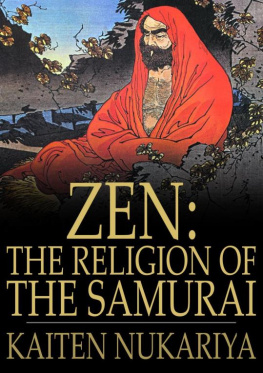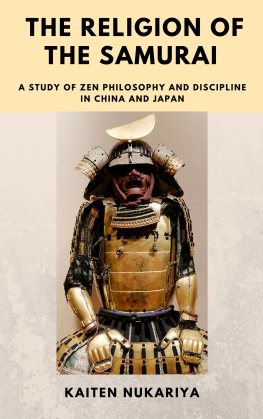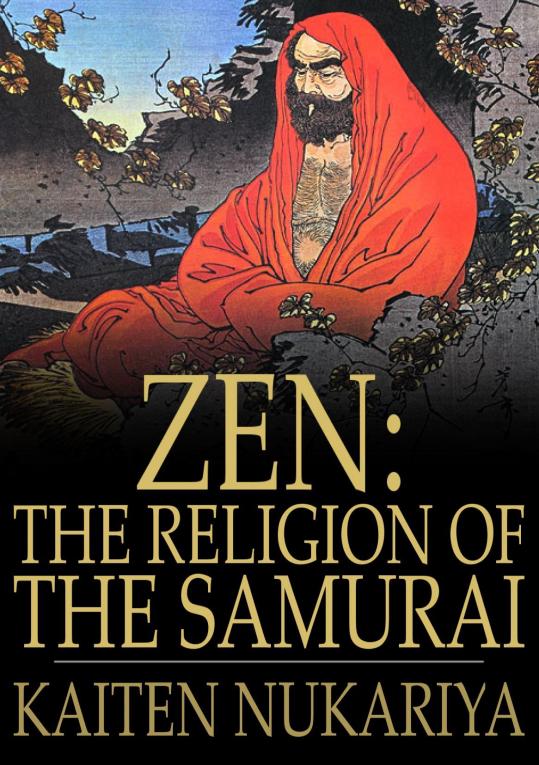ZEN: THE RELIGION OF THE SAMURAI
A STUDY OF ZEN PHILOSOPHY AND DISCIPLINE IN CHINA AND JAPAN
* * *
KAITEN NUKARIYA

*
Zen: The Religion of the Samurai
A Study of Zen Philosophy and Discipline in China and Japan
From a 1913 edition.
ISBN 978-1-775413-69-1
2009 THE FLOATING PRESS.
While every effort has been used to ensure the accuracy and reliability of the information contained in The Floating Press edition of this book, The Floating Press does not assume liability or responsibility for any errors or omissions in this book. The Floating Press does not accept responsibility for loss suffered as a result of reliance upon the accuracy or currency of information contained in this book. Do not use while operating a motor vehicle or heavy equipment. Many suitcases look alike.
Visit www.thefloatingpress.com
Contents
*
Introduction
*
Buddhism is geographically divided into two schools is known asMahayana (large vehicle), or superior doctrine. The chief tenets ofthe Southern School are so well known to occidental scholars thatthey almost always mean the Southern School by the word Buddhism.But with regard to the Northern School very little is known to theWest, owing to the fact that most of its original texts were lost,and that the teachings based on these texts are written in Chinese,or Tibetan, or Japanese languages unfamiliar to non-Buddhistinvestigators.
It is hardly justifiable to cover the whole system of Buddhism with asingle epithet and is still in full vigour, though in othercountries it has already passed its prime. Thus Japan seems to bethe best representative of the Buddhist countries where the majorityof people abides by the guiding principle of the Northern School. Tostudy her religion, therefore, is to penetrate into Mahayanism, whichstill lies an unexplored land for the Western minds. And toinvestigate her faith is not to dig out the remains of Buddhist faiththat existed twenty centuries ago, but to touch the heart and soul ofMahayanism that enlivens its devotees at the present moment.
The object of this little book is to show how the Mahayanistic viewof life and of the world differs markedly from that of Hinayanism,which is generally taken as Buddhism by occidentals, to explain howthe religion of Buddha has adapted itself to its environment in theFar East, and also to throw light on the existing state of thespiritual life of modern Japan.
For this purpose we have singled out of thirteen Japanese sects theZen Sect, not only because of the great influence it hasexercised on the nation, but because of the unique position it holdsamong the established religious systems of the world. In the firstplace, it is as old as Buddhism itself, or even older, for its modeof practising Meditation has been handed down without much alterationfrom pre-Buddhistic recluses of India; and it may, on that account,provide the student of comparative religion with an interestingsubject for his research.
In the second place, in spite of its historical antiquity, ideasentertained by its advocates are so new that they are in harmony withthose of the New Buddhists; accordingly the statement of theseideas may serve as an explanation of the present movement conductedby young and able reformers of Japanese Buddhism.
Thirdly, Buddhist denominations, like non-Buddhist religions, laystress on scriptural authority; but Zen denounces it on the groundthat words or characters can never adequately express religioustruth, which can only be realized by mind; consequently it claimsthat the religious truth attained by Shakya Muni in his Enlightenmenthas been handed down neither by word of mouth nor by the letters ofscriptures, but from teacher's mind to disciple's through the line oftransmission until the present day. It is an isolated instance inthe whole history of the world's religions that holy scriptures aredeclared to be 'no more than waste paper by religionists, asdone by Zen masters.
Fourthly, Buddhist as well as non-Buddhist religions regard, withoutexception, their founders as superhuman beings, but the practisers ofZen hold the Buddha as their predecessor, whose spiritual level theyconfidently aim to attain. Furthermore, they liken one who remainsin the exalted position of Buddhaship to a man bound by a gold chain,and pity his state of bondage. Some of them went even so far as todeclare Buddhas and Bodhisattvas to be their servants andslaves. Such an attitude of religionists can hardly be foundin any other religion.
Fifthly, although non-Buddhist people are used to call Buddhismidolatry, yet Zen can never be called so in the accepted sense of theterm, because it, having a grand conception of Deity, is far frombeing a form of idol-worship; nay, it sometimes even took aniconoclastic attitude as is exemplified by Tan Hia, whowarmed himself on a cold morning by making a fire of wooden statues.Therefore our exposition on this point will show the real state ofexisting Buddhism, and serve to remove religious prejudicesentertained against it.
Sixthly, there is another characteristic of Zen, which cannot befound in any other religion-that is to say, its peculiar mode ofexpressing profound religious insight by such actions as the liftingup of a hair-brush, or by the tapping of the chair with a staff, orby a loud outcry, and so forth. This will give the student ofreligion a striking illustration of differentiated forms of religionin its scale of evolution.
Besides these characteristics, Zen is noted for its physical andmental training. That the daily practice of Zazen and thebreathing exercise remarkably improves one's physical condition is anestablished fact. And history proves that most Zen masters enjoyed along life in spite of their extremely simple mode of living. Itsmental discipline, however, is by far more fruitful, and keeps one'smind in equipoise, making one neither passionate nor dispassionate,neither sentimental nor unintelligent, neither nervous nor senseless. It is well known as a cure to all sorts of mental disease,occasioned by nervous disturbance, as a nourishment to the fatiguedbrain, and also as a stimulus to torpor and sloth. It isself-control, as it is the subduing of such pernicious passions asanger, jealousy, hatred, and the like, and the awakening of nobleemotions such as sympathy, mercy, generosity, and what not. It is amode of Enlightenment, as it is the dispelling of illusion and ofdoubt, and at the same time it is the overcoming of egoism, thedestroying of mean desires, the uplifting of the moral ideal, and thedisclosing of inborn wisdom.
The historical importance of Zen can hardly be exaggerated. Afterits introduction into China in the sixth century, A.D., it grewascendant through the Sui (598-617) and the Tang dynasty (618-906),and enjoyed greater popularity than any other sect of Buddhism duringthe whole period of the Sung (976-1126) and the Southern Sung dynasty(1127-1367). In these times its commanding influence became soirresistible that Confucianism, assimilating the Buddhist teachings,especially those of Zen, into itself and changing its entire aspect,brought forth the so-called Speculative philosophy. whothereby founded a school, through which Zen exercised profoundinfluence on Chinese and Japanese men of letters, statesmen, andsoldiers.
As regards Japan, it was first introduced into the island as thefaith first for the Samurai or the military class, and moulded thecharacters of many distinguished soldiers whose lives adorn the pagesof her history. Afterwards it gradually found its way to palaces aswell as to cottages through literature and art, and at last permeatedthrough every fibre of the national life. It is Zen that modernJapan, especially after the Russo-Japanese War, has acknowledged asan ideal doctrine for her rising generation.














